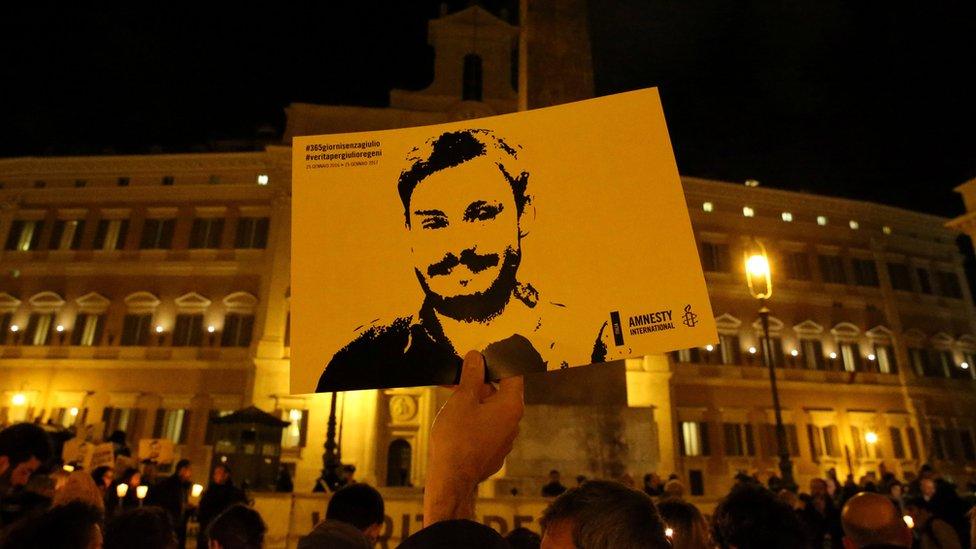Giulio Regeni: Egypt tried to cover up student murder, Italy says
- Published

Regeni was murdered and his body found dumped on the outskirts of Cairo in February 2016
Italian prosecutors have accused Egyptian officials of deliberately trying to mislead the investigation into student Giulio Regeni's death.
Regeni, a postgraduate student at the University of Cambridge, was doing research for his doctorate in Cairo when he went missing in January 2016.
His body was found nine days later.
Prosecutors said Egypt's claims about Regeni's death had either been contradicted by a post-mortem examination in Italy, or debunked.
Prosecutor Sergio Colaiocco was addressing the first session of a parliamentary commission set up to look into whether Regeni was the focus of scrutiny by security forces in Egypt before his death.
The topic the 28-year-old Italian student was looking into - independent trade unions - is politically controversial within Egypt.
What happened to Regeni?
The Italian PhD student disappeared on a research trip on 25 January 2016 - the fifth anniversary of the start of the uprising against former President Hosni Mubarak, when there was a heavy police presence in Cairo.
Regeni's body was eventually discovered in a ditch by the side of a road on 3 February.
His mother told the Italian parliament last year that her son's body was so disfigured, she was only able to identify him using the tip of his nose.
Addressing the commission in Rome on Tuesday, Mr Colaiocco said: "A web was spun by Egypt's national security service from the October preceding his death, a web in which the apparatus used the people closest to Giulio in Cairo."
People who knew Regeni passed information about him to the secret services, he alleged.
He added that the Italian post-mortem examination found Regeni had been tortured "in stages" between 25 January and the day of his death.
His body sustained injuries that showed he was beaten with "kicks, fists, sticks and clubs", and that he died from a broken neck, Mr Colaiocco added.
Egypt has denied accusations that Regeni died in custody. However, officials have admitted that the security services were monitoring him.
What were Egypt's 'misleading' claims?
"Fake stories were fabricated to throw off the investigation" almost as soon as Regeni's body was found, Mr Colaiocco told the hearing.
The first was that a postmortem examination - carried out in Egypt - showed that the student had been killed in a car accident. This has been contradicted by the postmortem carried out in Italy.
Another was that, because Regeni was naked when his body was found, there was a sexual motive behind his death.

Italian prosecutors have accused Egyptian officials of making four attempts to mislead the investigation
Then in March that year, Mr Colaiocco said, a "witness" claimed on television that he saw Regeni arguing with a foreigner near the Italian consulate the evening before his death.
This claim was later debunked by telephone records showing the supposed witness was nowhere near the consulate at the time, and that Regeni was at home watching a film online when the fight was supposed to have taken place.
Finally, officials said Regeni was killed by a five-strong criminal gang - and that all of them were then killed in a shootout. This claim was later branded "implausible".
Egypt's disappeared (Video from 2016)
Mr Colaiocco and fellow-prosecutor Michele Prestipino have been investigating Regeni's death in coordination with Egyptian officials - but almost four years later, no-one has been charged.
Last year, Italy placed five members of the Egyptian security forces under official investigation for their alleged involvement.
Mr Prestipino said coordinating with Egypt was tricky, because the two nations don't have bilateral judicial pacts.
"The public prosecutor's office will continue with determination to do all it can to find evidence and work out what happened," he said.
- Published4 December 2018

- Published26 January 2018

- Published17 January 2018
